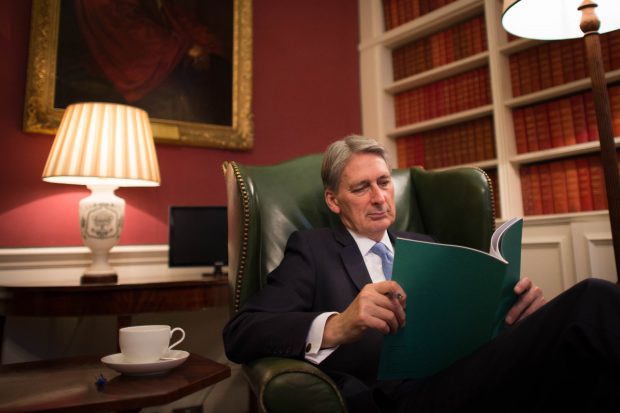Philip Hammond offered up few surprises in his Autumn Statement. As predicted, he said the minimum wage will go up (slightly), fuel duty will be frozen, letting agency fees will be banned and George Osborne’s welfare reforms will be partly softened, with the ‘taper rate’ for Universal Credit slowed down. But he did save room for one rabbit in the hat: this year’s Autumn Statement will be the last, the Chancellor announced. Instead, from 2018 there will be a ‘Spring Statement, Hammond said – and the main budget will take place in the Autumn. It was also revealed that the OBR’s updated forecast for next year suggests Britain’s economy will grow by 1.4 per cent – a fall from the 2.2 per cent predicted before the referendum. Here’s the Spectator‘s coverage of the Autumn Statement, as it unfolded:
1.30pm: The Chancellor finishes off his Autumn Statement by saying it’ll be his last – and that he will be scrapping the November announcement. Instead, Hammond went on to say that from 2018 there will be a ‘Spring Statement’, which will discuss ‘the forecast from the OBR’, and the main budget will take place in Autumn.
1.20pm: Hammond confirms plans to up the National Living Wage by 30p an hour and reduce the Universal Credit taper rate from 65 per cent to 63 per cent. The Chancellor also says – as expected – that fuel duty will be frozen and letting agencies will be banned from charging fees to tenants.
1.17pm: Insurance tax is going up, rising from 10 per cent to 12 per cent from next June, Hammond confirms.
1.15pm: The Chancellor says Britain ‘will keep our promise to the world’s poorest through our overseas aid budget, And we will meet our pledge to our country’s pensioners through the triple lock’. But he leaves room for some wiggle room in the future, saying that ‘the government will review public spending priorities and other commitments for the next Parliament’.
1.10pm: Donald Trump has suggested he plans to slash corporation tax in the US down to 15 per cent. But Philip Hammond says there are no immediate plans to emulate the Donald’s policy in Britain. He says: ‘I know how much business values certainty and stability, and so I confirm today that we will stick to the business tax roadmap we set out in March. Corporation tax will fall to 17 per cent’.
1.09pm: Hammond says he is sticking to the script with the government’s plans to make £3.5bn of savings across Whitehall – with one exception: the Chancellor has pledged funding ‘to tackle urgent prison safety issues’ by upping the number of prison officers by 2,500.
1.08pm: Hammond takes a pop at George Osborne. In a dig at the former chancellor’s style at the despatch box, he tells the Commons: ‘I have deliberately avoided making this statement into a long list of individual projects being supported’.
1.04pm: George Osborne will be happy. The Chancellor has just repeated his commitment to his predecessor’s Northern Powerhouse pet project. Hammond says that £1.8bn from the Local Growth Fund will be put aside to the English regions, including £556m to Local Enterprise Partnerships in the North.
12.58pm: As expected, Hammond announces a £1bn investment in Britain’s 5G internet network, as well as £1.1bn of investment in transport projects, and a £2.3bn Housing Infrastructure Fund.
12.55pm: The Chancellor calls Britain’s productivity gap ‘shocking’, saying that ‘too many British workers work longer hours for lower pay than their counterparts’. Hammond says that this gap ‘means in the real world, it takes a German worker four days to produce what we make in five’.
12.46pm: ‘The Government has no plans to introduce further welfare savings measures in this Parliament,’ the Chancellor says.
12.45pm: The deficit is going down, says the Chancellor, who tells the Commons that: ‘Overall public sector net borrowing as a percentage of GDP will fall from 4 per cent last year to 3.5 per cent this year, and will continue to fall over the Parliament, reaching 0.7 per cent in 2021-22’.
12.43pm: The government will ‘no longer seek to deliver a surplus in 2019-20’, says Hammond, who goes on to say that ‘the Prime Minister and I remain firmly committed to seeing the public finances return to balance as soon as practicable’.
12.42pm: ‘As the effects of uncertainty diminish, the OBR forecasts growth recover to 1.7 per cent in 2018, 2.1 per cent in 2019 and 2020, and 2 per cent in 2021,’ says Philip Hammond.
12.41pm: Today’s OBR forecast is for growth to be 2.1 per cent in 2016; higher than forecast in March. But the OBR downgraded growth for 2017 to 1.4 per cent. But despite the drop, the Chancellor does his best to put on a positive face. He tells the Commons that the OBR forecast is ‘still equivalent to the IMF’s forecast for Germany, and higher than the forecast for growth in many of our European neighbours, including France and Italy’.

12.40pm: Hammond make a quip at Boris Johnson’s expense, saying he will be no better at pulling rabbits from hats than the Foreign Secretary was at collecting loose rugby balls from rugby scrums.
12.39pm: Philip Hammond starts by paying tribute to his predecessor George Osborne for bringing down the deficit. But he says ‘times have moved on’.







Comments